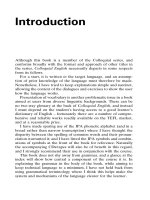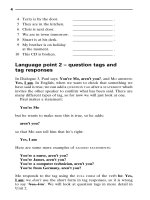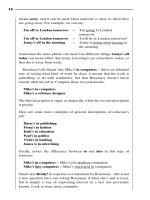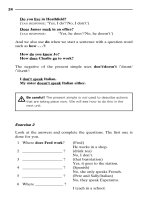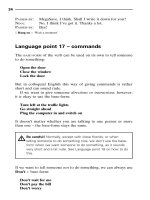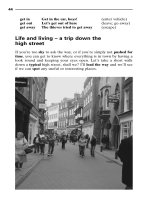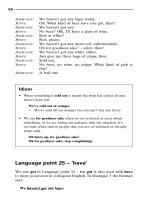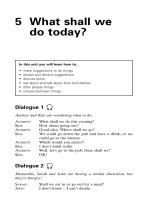A complete English language course part 8
Bạn đang xem bản rút gọn của tài liệu. Xem và tải ngay bản đầy đủ của tài liệu tại đây (241.73 KB, 10 trang )
A
SSISTANT
: We haven’t got any lager today.
J
ENNY
: Oh. What kind of beer have you got, then?
A
SSISTANT
: We haven’t got any.
J
ENNY
: No beer? OK, I’ll have a glass of wine.
A
SSISTANT
: Red or white?
J
ENNY
: Red, please.
A
SSISTANT
: We haven’t got any more red, unfortunately.
J
ENNY
: Oh for goodness sake! – white, then!
A
SSISTANT
: We haven’t got any white either.
J
ENNY
: Just give me three bags of crisps, then.
A
SSISTANT
: Sold out.
J
ENNY
: No beer, no wine, no crisps, What kind of pub is
this?
A
SSISTANT
: A bad one.
Language point 25 – ‘have’
We saw got in Language point 24 – but got is also used with have
to show possession in colloquial English. In Dialogue 3 the barman
says:
We haven’t got
any lager
54
Idiom
• When something is sold out it means the shop has sold it all and
there’s none left:
We’ve sold out of oranges
= ‘We’ve sold all our oranges (so you can’t buy any here)’
• We say for goodness sake when we are irritated or cross about
something, or we are losing our patience with the situation. It’s
not rude when said to people that you are on informal or friendly
terms with.
Oh hurry up, for goodness sake!
Oh for goodness sake, stop complaining!
Look at some more examples:
I’ve got five pounds
Terry hasn’t got any money at all
Susan’s got a Ferrari
Have you got a ten-pound note?
Notice that got doesn’t change, but that have changes to has for the
third person singular, and that we use
SHORT FORMS
of have in state-
ments, and
LONG FORMS
+ n’t in the negative:
I’ve I haven’t
you’ve you haven’t
he’s he hasn’t
she’s
got
she hasn’t
got
we’ve we haven’t
they’ve they haven’t
This meaning of got is different from the one Helen uses in Dialogue
2, when she says I got some apples. Compare these two sentences:
I got some apples = ‘I bought some apples’
(action of getting)
I’ve got some apples = ‘I have some apples’ (possession)
We’ve already seen that get/got has a number of different meanings
– and this is true of have as well. Jenny says:
I’ll have a glass of wine
Here she isn’t talking about possession, she’s using I’ll have to order
a drink or say what she wants. Similarly, if someone wants to buy
someone else a drink, they often say:
What’ll you have?
Because this isn’t possession, we don’t use have got, so we can’t say:
‘I’ll have got a glass of wine.
’
‘What’ll you have got?
’
We’ll see other uses of have in later units.
1111
2
3
4
5
6
7
8
9
10
11
1211
13
14
15
16
17
18
19
20
21
22
23
24
25
26
27
28
29
30
31
32
33
34
35
36
37
38
39
40
41
4211
55
Exercise 5
These sentences all use have got to talk about possession – change
them as indicated. The first two are done for you.
1 Dave’s got a new car. [?] Has Dave got a new car?
2 You haven’t got a phone. [?] Have you got a phone?
3 Has he got time? [+] _____________________
4 I haven’t got enough time. [+] _____________________
5 Have they got enough money? [–] _____________________
6 Su’s got a car. [–] _____________________
7 We haven’t got the tickets. [?] _____________________
8 Has Fiona got them? [+] _____________________
Exercise 6
Put a tick against the possession sentences, and a cross against the
others.
1 I have eggs for breakfast every morning. __
2 Jenny’s got a big paper bag. __
3 Have you got any money on you? __
4 I’ll have a cup of coffee, please. __
5 My brother hasn’t got a jacuzzi. __
6 Jenny got a big paper bag. __
7 The children are having fun. __
8 What’ll you have? __
9 Henry got a letter this morning. __
10 Has your house got central heating? __
Dialogue 4
Dave isn’t happy with the bill.
D
AVE
: Could you check this bill for me – I don’t think it’s right.
W
AITER
: Certainly. First, did you have two coffees?
D
AVE
: Yes. Then I had a Danish pastry and my friend here had
a roll and butter.
W
AITER
:[ticking them off on the bill]
OK. Then you had two mineral waters.
D
AVE
: No. I didn’t have a mineral water. My friend had one,
but I had another coffee.
W
AITER
: Ah . . . sorry about that. You were right, and I was
wrong.
56
Language point 26 – ‘two coffees’
We saw in Language point 23 that words such as coffee are
UNCOUNTABLE
(UC), and that this means that they:
• can’t have plurals
• can’t be used with numbers
But in Dialogue 4 the waiter says:
Did you have two coffees
?
We also saw that UC nouns can’t be used with a/an, but Dave says:
I didn’t have a
mineral water
These examples seem to break the rules, but they don’t. Some
uncountable nouns can also be countable (C) in special cases:
• coffee (UC) = the drink itself
• coffee (C) = ‘a cup of coffee’ – cup is a
COUNTABLE
noun, so coffee
is countable when it means this, and it behaves like any other
countable noun:
a coffee
two coffees
Another example of a UC/C noun is paper: it means the material
itself when it’s UC, but it means newspaper when it’s C:
I’m going to buy some
paper (UC) (to write on)
I’m going to buy a
paper (C) (to read)
1111
2
3
4
5
6
7
8
9
10
11
1211
13
14
15
16
17
18
19
20
21
22
23
24
25
26
27
28
29
30
31
32
33
34
35
36
37
38
39
40
41
4211
57
Idiom
• We use sorry, of course, to apologise to someone. If we want to
refer back to the situation or incident we’re apologising for, we
say sorry about that.
Most dictionaries for learners of English will tell you when a noun
can be both UC and C. Some books and dictionaries call UC nouns
MASS NOUNS
.
Language point 27 – ‘don’t think’
In Dialogue 4, Dave is unhappy with the bill. He thinks to himself:
The bill isn’t
right
but then he says to the waiter:
I don’t think it’s
right
not ‘I think it isn’t right
’
In colloquial English we don’t usually say I think when what follows
is
NEGATIVE
– instead we change it round and say I don’t think +
POSITIVE
. Here are some more examples:
I don’t think Sarah’s coming (Sarah isn’t coming)
I don’t think you’re right (you aren’t right)
I don’t think we’ve got time (we haven’t got time)
Exercise 7
Change the following into ‘I don’t think . . .’ sentences. The first one
is done for you.
1 Kath isn’t here. I don’t think Kath’s here
2 My watch isn’t working properly. _____________________
3 The children aren’t hungry. _____________________
4 That’s not important. _____________________
5 The coffee isn’t very nice. _____________________
6 We aren’t on the right bus. _____________________
7 This bus doesn’t go to the airport. _____________________
8 You don’t understand. _____________________
9 Henry doesn’t read books. _____________________
10 The students aren’t listening. _____________________
58

